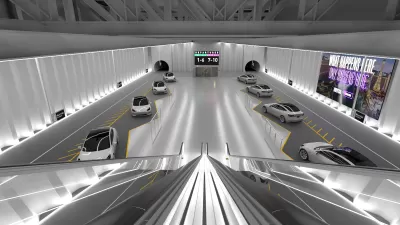Demonstrations at the Consumer Electronics Show in Las Vegas highlight the failures of Tesla's autonomous vehicles and the Boring Company's tunnels.

According to an article by Alissa Walker, the failures of two highly anticipated Elon Musk projects were clearly articulated at the Consumer Electronics Show in Las Vegas, where Tesla's autonomous cars and Musk's Boring Company tunnels were both on display.
After the Las Vegas tourism agency paid Musk's Boring Company $50 million to build tunnels under the city's convention center, video posted on social media showed cars stuck in traffic inside the tunnel, described horrifyingly by Walker as "the world's longest MRI machine." The tunnel, which was supposed to turn a 20-minute walk into a one-minute ride, was designed—and contractually obligated—to shuttle 4,000 people per hour during major trade shows at the convention center. To date, the tunnel moves roughly 1,300 people per hour. Walker notes that this is "about the capacity of standard (and, often, autonomous) people-movers all over Vegas."
Meanwhile, as part of a presentation about LIDAR technology, Tesla's autonomous cars consistently failed to identify a child-sized dummy, hitting the "child" every time. The presentation was demonstrating pedestrian detection systems which industry safety experts agree should be robust and redundant on automated vehicles.
Last month, Tesla was forced to recall almost half a million of its Model 3 and Model S cars after the National Highway Traffic Safety Administration (NHTSA) identified problems with the rearview camera and front hood, which could open without warning while driving. The agency is also investigating Tesla's autonomous driving features and other safety concerns.
FULL STORY: Two of Elon Musk's Terrible Ideas Both Flopped in Las Vegas

Planetizen Federal Action Tracker
A weekly monitor of how Trump’s orders and actions are impacting planners and planning in America.

Maui's Vacation Rental Debate Turns Ugly
Verbal attacks, misinformation campaigns and fistfights plague a high-stakes debate to convert thousands of vacation rentals into long-term housing.

Restaurant Patios Were a Pandemic Win — Why Were They so Hard to Keep?
Social distancing requirements and changes in travel patterns prompted cities to pilot new uses for street and sidewalk space. Then it got complicated.

In California Battle of Housing vs. Environment, Housing Just Won
A new state law significantly limits the power of CEQA, an environmental review law that served as a powerful tool for blocking new development.

Boulder Eliminates Parking Minimums Citywide
Officials estimate the cost of building a single underground parking space at up to $100,000.

Orange County, Florida Adopts Largest US “Sprawl Repair” Code
The ‘Orange Code’ seeks to rectify decades of sprawl-inducing, car-oriented development.
Urban Design for Planners 1: Software Tools
This six-course series explores essential urban design concepts using open source software and equips planners with the tools they need to participate fully in the urban design process.
Planning for Universal Design
Learn the tools for implementing Universal Design in planning regulations.
Heyer Gruel & Associates PA
JM Goldson LLC
Custer County Colorado
City of Camden Redevelopment Agency
City of Astoria
Transportation Research & Education Center (TREC) at Portland State University
Jefferson Parish Government
Camden Redevelopment Agency
City of Claremont




























